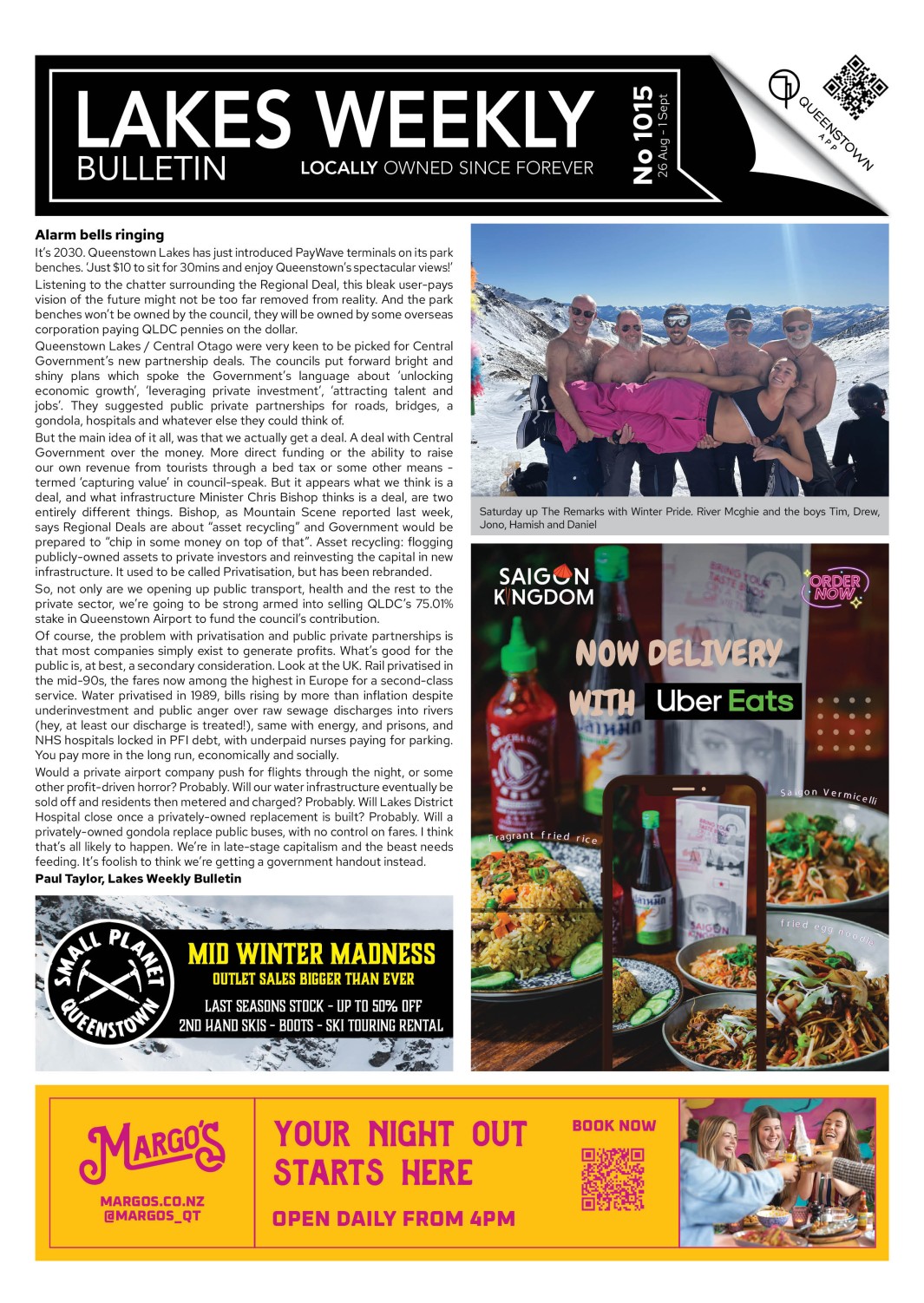Latest issue
#1015
Alarm bells ringing
by Paul Taylor, Lakes Weekly Bulletin
It’s 2030. Queenstown Lakes has just introduced PayWave terminals on its park benches. ‘Just $10 to sit for 30mins and enjoy Queenstown’s spectacular views!’
Listening to the chatter surrounding the Regional Deal, this bleak user-pays vision of the future might not be too far removed from reality. And the park benches won’t be owned by the council, they will be owned by some overseas corporation paying QLDC pennies on the dollar.
Queenstown Lakes / Central Otago were very keen to be picked for Central Government’s new partnership deals. The councils put forward bright and shiny plans which spoke the Government’s language about ‘unlocking economic growth’, ‘leveraging private investment’, ‘attracting talent and jobs’. They suggested public private partnerships for roads, bridges, a gondola, hospitals and whatever else they could think of.
But the main idea of it all, was that we actually get a deal. A deal with Central Government over the money. More direct funding or the ability to raise our own revenue from tourists through a bed tax or some other means - termed ‘capturing value’ in council-speak. But it appears what we think is a deal, and what infrastructure Minister Chris Bishop thinks is a deal, are two entirely different things. Bishop, as Mountain Scene reported last week, says Regional Deals are about “asset recycling” and Government would be prepared to “chip in some money on top of that”. Asset recycling: flogging publicly-owned assets to private investors and reinvesting the capital in new infrastructure. It used to be called Privatisation, but has been rebranded.
So, not only are we opening up public transport, health and the rest to the private sector, we’re going to be strong armed into selling QLDC’s 75.01% stake in Queenstown Airport to fund the council’s contribution.
Of course, the problem with privatisation and public private partnerships is that most companies simply exist to generate profits. What’s good for the public is, at best, a secondary consideration. Look at the UK. Rail privatised in the mid-90s, the fares now among the highest in Europe for a second-class service. Water privatised in 1989, bills rising by more than inflation despite underinvestment and public anger over raw sewage discharges into rivers (hey, at least our discharge is treated!), same with energy, and prisons, and NHS hospitals locked in PFI debt, with underpaid nurses paying for parking. You pay more in the long run, economically and socially.
Would a private airport company push for flights through the night, or some other profit-driven horror? Probably. Will our water infrastructure eventually be sold off and residents then metered and charged? Probably. Will Lakes District Hospital close once a privately-owned replacement is built? Probably. Will a privately-owned gondola replace public buses, with no control on fares. I think that’s all likely to happen. We’re in late-stage capitalism and the beast needs feeding. It’s foolish to think we’re getting a government handout instead.
WHY ADVERTISE YOUR BUSINESS WITH US
The Lakes Weekly is part of Queenstown Media Group (QMG).
QMG is Queenstown’s leading locally owned and operated media company with print, online and social platforms that engage locals with what they care about — everything local!
The Lakes Weekly delivers stories and news that connects with local so they come away each week better connected to their community. Advertising sits within this curated content environment, and it’s a trusted relationship between readers and the Lakes Weekly. Advertisers benefit from the association with the LWB brand values.
The Lakes Weekly is hand delivered to every business in Queenstown, Arrowtown, Frankton, Five Mile Remarkables Park and Glenda Drive on Tuesday. Copies are available in service stations, libraries and drop boxes throughout the region and every supermarket throughout the Queenstown basin and Wanaka.
Online the issue is available Monday afternoon, on lwb.co.nz and the Qtn App.
3,500
Printed copies
each week
13,250
Estimated weekly
readership
Latest issue

